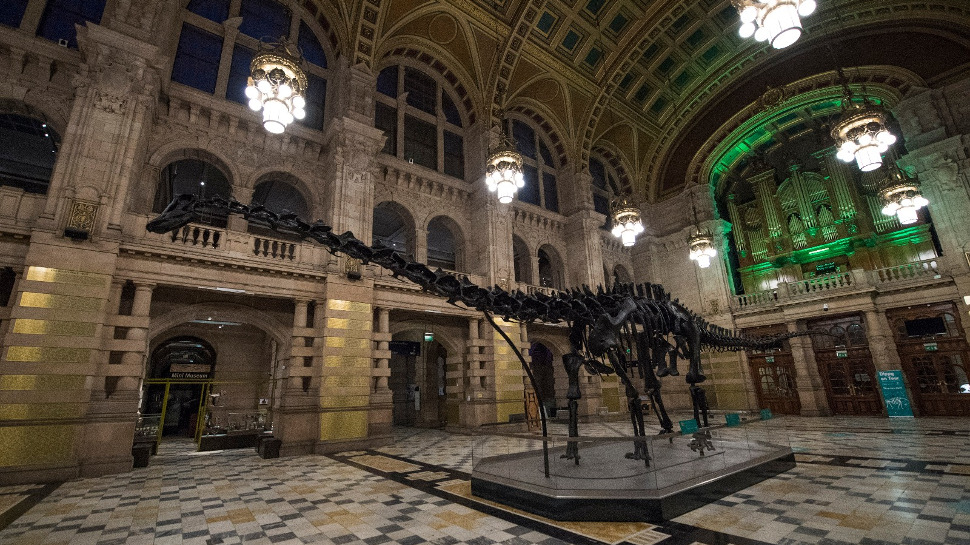How Dell is helping the Natural History Museum encourage the UK’s next generation of scientists
Why the Natural History Museum wants to be much more than “just a museum with a website”.

Sign up for breaking news, reviews, opinion, top tech deals, and more.
You are now subscribed
Your newsletter sign-up was successful
With over 4.5 million visitors every year, including countless numbers of school trips, the Natural History Museum is one of the UK’s most popular tourist attractions.
But the museum can also play a vital role in inspiring young children to get interested in science, and now the 138-year-old institution it is looking to push this even further - thanks to the help of Dell Technologies.
The two organisations have been working together for over ten years, and spoke at the BETT 2019 event in London this week about the role technology can play in inspiring young children to get into science and history.
“Our work with the NHM is about lighting up the connection between the children and the natural world, trying to excite their interest in nature, protecting nature and in science, particularly the natural sciences,” says Claire Vyvyan, senior vice president of Dell EMC’s UK & Ireland commercial business.
The computing giant has been highlighting the role it plays in supporting the Museum and the 350-strong research team it employs to get the most out of the vast historical archive it possesses.
“The real work of the museum is what they do, in a scientific sense, behind the scenes,” notes Vyvyan, “from slicing and dicing and dissecting and storing of data and computing of data to help the real work of the museum.”
“We’re now turning that into the front-end...Making sure (this) is available for future generations is absolutely critical,”
Sign up to the TechRadar Pro newsletter to get all the top news, opinion, features and guidance your business needs to succeed!
Unique position
“It’s a really unique position to be in,” says Nathan Good, lead product manager, digital media and marketing at the Natural History Museum, “We have to create world-leading technology digital products...and I quite like the idea that we don’t know how we will be researching in a few years time! Our understanding and perception of the natural world around us will be determined by how we analyse it.”
“We're more than just a museum with a website.”
The Museum has enjoyed great recent success with its travelling exhibitions, most notably Dippy the Diplodocus, who is currently touring the UK, allowing thousands of people to view a vital piece of scientific history.
Moving forward, technology is set to play an increasing central role for the Natural History Museum, with Good noting that, “we don’t really have a choice” in embracing new tech-friendly experiences.
“It’s so prevalent in children from such a young age,” he says, “you want to be speaking the same language as them, so there is absolutely no barrier to children and young families using technology.”

This extends even outside of the museum, where services like the Naturenauts game and the Museum’s website (which saw 12 million web sessions last year) all helping boost its unique outreach.
But the Museum wants to go further, particularly in encouraging the next generation of scientists, and has now launched Dippy's Naturenauts, a mobile game that helps children explore the natural world on their doorstep.
The app introduces children to many of the wonders of nature around them, and can even be used offline, to allow learning wherever you are.
Dell is one of the best-known names in the worldwide computing space, but has been concentrating on the education sector as a key focus, not just for growth, Vyvyan says, but also for the opportunity it offers to better society as a whole.
The company has also worked with the likes of the British Museum and the Vatican in order to help with digitising incredibly valuable archives to preserve them for future generations and research purposes.
But it is understandably proud of the partnership it has with the Natural History Museum, which it sees as a great example of how technology can help benefit the world around us, both now and in the future.
“You just don’t know where the world is going,” Vyvyan says, “this partnership is really important in using technology to connect to nature - technology gets a bad press, but it is also the solution to many of the world’s problems - including getting children connected to nature.”
- The best laptops for college students 2019: all the best options for school work

Mike Moore is Deputy Editor at TechRadar Pro. He has worked as a B2B and B2C tech journalist for nearly a decade, including at one of the UK's leading national newspapers and fellow Future title ITProPortal, and when he's not keeping track of all the latest enterprise and workplace trends, can most likely be found watching, following or taking part in some kind of sport.